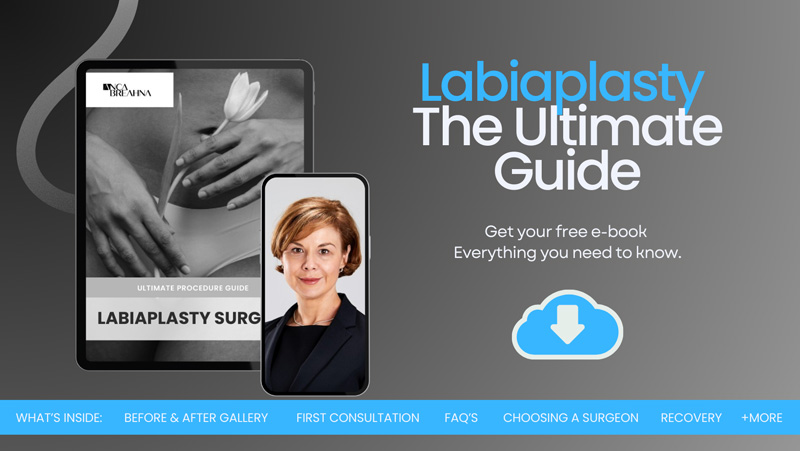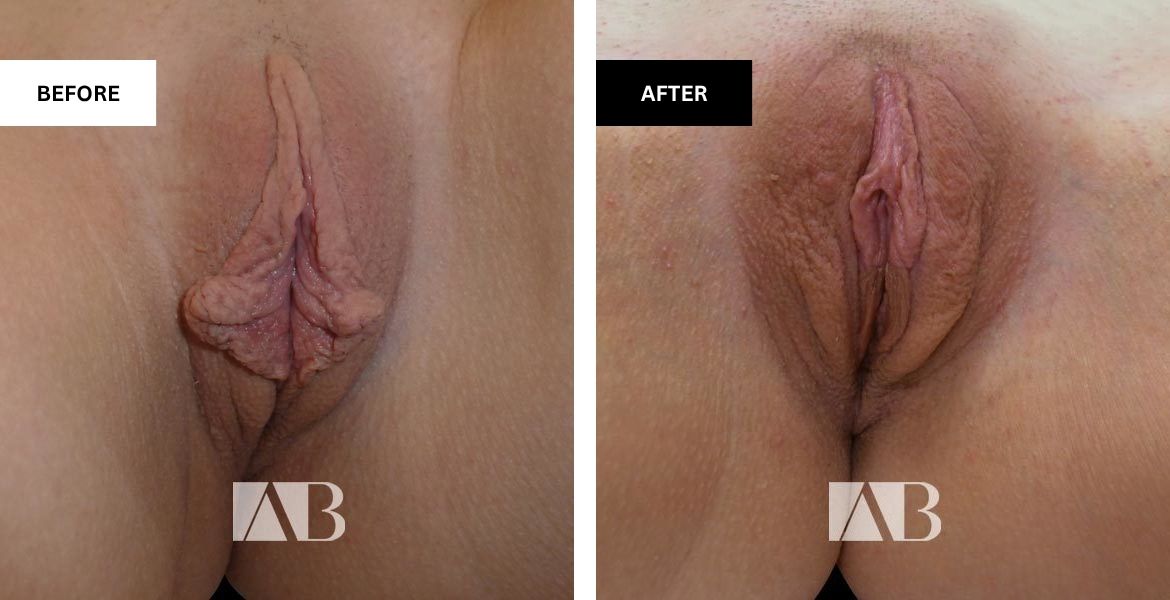
- Take our Plastic Surgery Quiz to find out if you'd be a good candidate for cosmetic surgery.
- Why Women Consider Labiaplasty
- Download Miss Anca Breahna Labiaplasty Guide
- Your Consultation with Miss Anca Breahna in Chester
- How Is the Procedure Performed?
- Trim Technique
- Wedge Technique
- De-epithelialisation or Hybrid Techniques
- Labiaplasty Before and After Photos
- Anaesthesia and Surgical Setting in Chester
- Recovery and Aftercare
- What to Expect in the First Few Days
- Activity Timeline
- What Results Can You Expect?
- Understanding Risks and Making an Informed Choice
- Why Choose Miss Anca Breahna in Chester
- FAQs About Labia Minora Removal
- Ready to Talk Confidentially?
- Further Reading
Labia minora removal – also known as labiaplasty – is a specialised, highly personalised surgical procedure designed to reshape or reduce the inner folds of the vulva. It’s a treatment that, although not widely spoken about, is sought by many women seeking relief from discomfort or enhanced confidence.
As a Consultant Plastic, Reconstructive and Aesthetic Surgeon based in Chester, I, Miss Anca Breahna, support my patients through every step of this delicate process – from consultation to final results – with compassion, discretion, and expert surgical care.
Take our Plastic Surgery Quiz to find out if you’d be a good candidate for cosmetic surgery.
What Is Labia Minora Removal?
Labia minora removal is a form of cosmetic genital surgery that focuses on reshaping the labia minora – the smaller, inner lips of the vulva. These tissues may be naturally large, stretched, asymmetrical, or may have changed over time due to hormonal shifts, childbirth, or ageing.
The procedure helps to:
- Reduce excessive tissue that may protrude beyond the labia majora, which can lead to visibility through clothing or undergarments.
- Restore balance in cases of noticeable asymmetry between the left and right labia.
- Alleviate discomfort during physical activity, movement, or sexual intercourse.
- Improve personal confidence, body image, and emotional wellbeing for patients who feel self-conscious about their intimate area.
Each labiaplasty I perform in Chester is highly individualised, focused on achieving both functional improvement and natural, aesthetically pleasing results.
Why Women Consider Labiaplasty
Many women choose to explore labia minora reduction not out of vanity, but to resolve genuine concerns that affect their daily lives and comfort. These include:
- Physical discomfort: Enlarged or protruding labia can cause irritation or friction against clothing, particularly during activities such as running, cycling, horse riding, or even walking. This persistent rubbing can lead to inflammation, redness, and recurring soreness.
- Intimacy issues: During sexual activity, excess labial tissue may be pulled or pinched, leading to discomfort or embarrassment. Some women find it difficult to fully enjoy intimacy because of physical pain or self-consciousness, which can affect relationships and emotional wellbeing.
- Post-childbirth changes: After pregnancy and childbirth, the tissues of the vulva may become stretched or damaged, altering their appearance or causing a sagging sensation. For some, labiaplasty restores the area closer to its pre-pregnancy condition, supporting both comfort and self-esteem.
- Hygiene and menstrual care: Excessive tissue may trap moisture, increasing the risk of irritation, thrush, or other infections. During menstruation, hygiene routines may become more difficult, with sanitary products becoming uncomfortable to use or ill-fitting.
- Aesthetic concerns: Some women have never liked the appearance of their labia and feel self-conscious in certain types of clothing, during intimacy, or even when changing in communal areas. Labiaplasty can help align physical appearance with personal preferences, fostering greater body confidence.
At my practice in Chester, I provide a supportive space for these concerns to be explored openly and respectfully. There is no “right” or “wrong” reason – what matters is how you feel.
Download Miss Anca Breahna Labiaplasty Guide

Your Consultation with Miss Anca Breahna in Chester
Booking a private consultation is your first step toward clarity, support, and personalised care. Here’s what to expect when you meet with me:
- Discuss your goals: We’ll begin by exploring why you’re considering labiaplasty. Whether you’re motivated by physical symptoms, aesthetic preferences, or post-childbirth changes, I’ll take the time to fully understand your perspective – without judgement and with complete confidentiality.
- Review your health history: I’ll ask about any previous surgeries, childbirths, gynaecological concerns, or general health conditions. This is to ensure that you are medically fit for the procedure and that your body is likely to heal well post-operatively.
- Conduct a discreet examination: With your consent and comfort as my priority, I will gently assess the area to understand your anatomy and determine the most suitable surgical technique. I ensure the process is respectful, professional, and never rushed.
- Provide detailed information: I will walk you through each part of the procedure, including how it is performed, where it will take place, what anaesthesia will be used, what recovery involves, and what results to expect. I use diagrams or models when helpful to explain.
- Answer your questions: You are encouraged to ask anything at all. Whether it’s about recovery time, long-term outcomes, or how soon you can return to exercise or intimacy – no question is too small or too personal.
My role is to give you the tools and confidence you need to make the right decision for your body, with the trusted guidance of a Consultant Plastic, Reconstructive and Aesthetic Surgeon.
How Is the Procedure Performed?
Labiaplasty is typically performed as a day-case procedure, which means you’ll go home the same day, with minimal disruption to your routine. Depending on your preferences and clinical needs, one of the following techniques will be used:
Trim Technique
- This involves removing the excess edge of the labia minora, then reshaping and suturing the area for a refined, neater appearance.
- Best for patients who have pigmentation changes, fraying or uneven edges, or who want to reduce the overall length of the labia.
- Offers a straightforward, highly effective solution that smooths and shortens the labia with precision.
Wedge Technique
- A V-shaped wedge of tissue is removed from the centre of the labia minora, allowing the outer edges to be preserved.
- Ideal for patients who want to retain the natural appearance and texture of the labial edge.
- Helps reduce bulk or asymmetry while maintaining anatomical integrity.
De-epithelialisation or Hybrid Techniques
- In some cases, a less invasive approach may be used to remove only the surface skin (epithelium), preserving volume while reducing projection.
- Occasionally, I combine techniques to suit specific anatomical features, scarring, or post-pregnancy changes.
All procedures are performed using fine dissolvable sutures, ensuring clean healing with minimal visible scarring.
Labiaplasty Before and After Photos
Anaesthesia and Surgical Setting in Chester
Labia minora removal is safely performed in a private hospital setting in Chester, such as Nuffield Health The Grosvenor Hospital or Spire Murrayfield Hospital, Wirral. You can choose the type of anaesthesia that feels most comfortable for you:
- Local anaesthetic with sedation: Numbs the area while you remain lightly relaxed but conscious. Ideal for patients seeking a shorter recovery and less post-anaesthetic grogginess.
- General anaesthetic: You’ll be fully asleep for the duration of the procedure. Often preferred by patients with anxiety or those undergoing combined treatments.
Your comfort, dignity, and safety are central to my surgical planning and patient care philosophy.
Recovery and Aftercare
Healing from labiaplasty is typically straightforward, especially when following the aftercare instructions I provide. Here’s what to expect:
What to Expect in the First Few Days
- Mild swelling, tenderness, and light bruising around the surgical site are completely normal. These symptoms typically peak around day 3-5 and steadily improve.
- Pain is usually described as low to moderate and can be managed with over-the-counter or prescribed medication.
- Wearing loose cotton underwear and avoiding friction will aid healing and keep you comfortable.
Activity Timeline
- Days 1-5: Rest at home, keep the area clean, apply cool packs gently, and follow hygiene instructions closely.
- Week 1-2: Most women return to non-strenuous work and daily routines. Light walking is encouraged to promote circulation.
- Week 3-4: Swelling continues to reduce. Many resume gentle exercise and can begin light stretching or yoga.
- Week 6 onwards: Most patients are cleared to resume full physical activity, including sexual intercourse, based on healing progress.
I offer full post-op support, including follow-up appointments at my Chester clinic, and personalised recovery plans tailored to your needs.
What Results Can You Expect?
Results from labiaplasty are both functional and aesthetic. You can expect:
- A more proportionate, symmetrical appearance of the labia that aligns with your personal preferences.
- Freedom from irritation or pulling sensations, allowing you to move, exercise, and dress without discomfort.
- Increased confidence and emotional wellbeing, especially during intimacy or while wearing form-fitting clothing.
- Discrete scarring hidden in the natural folds of the tissue, fading over time until nearly imperceptible.
The final results usually settle within 8-12 weeks, once swelling resolves and the tissues soften. My goal as your Consultant Plastic, Reconstructive and Aesthetic Surgeon is to achieve an outcome that feels both natural and empowering.
Understanding Risks and Making an Informed Choice
Labiaplasty is a safe, refined procedure with a high satisfaction rate, but like all surgery, it carries some risks. These may include:
- Minor bleeding or bruising, which resolves naturally within a few days.
- Temporary numbness or altered sensation, particularly around the surgical area, which usually returns to normal within weeks.
- Infection or delayed wound healing, which is rare and manageable with early intervention.
- Slight asymmetry or scarring, though great care is taken to minimise this through surgical planning and technique.
During your consultation in Chester, I provide comprehensive information about risks and realistic expectations, ensuring that your decision is fully informed and medically sound.
Why Choose Miss Anca Breahna in Chester
- Expert Credentials: I am one of the few female Consultant Plastic, Reconstructive and Aesthetic Surgeons in the region, with advanced training and experience in aesthetic and reconstructive genital surgery.
- Female-Led, Compassionate Care: As a woman, I understand the emotional and physical nuances of labiaplasty. My approach is sensitive, empowering, and entirely patient-led.
- Long-Term Results and Safety: I prioritise outcomes that feel natural, last long-term, and uphold the highest standards of medical care.
- Local Accessibility: With private clinics and operating privileges in Chester and the Wirral, your care remains consistent, convenient, and confidential.
When you choose my care, you choose a practice built on trust, respect, and surgical excellence.
FAQs About Labia Minora Removal
Can labiaplasty improve more than just physical discomfort?
Yes, absolutely. While labiaplasty is often sought for physical reasons – such as reducing irritation, chafing, or pulling sensations – it also has a profound effect on emotional wellbeing. Many women feel a renewed sense of body confidence, especially in intimate situations or when wearing certain clothing. Feeling in control of your body can enhance comfort on many levels, not just the physical.
Will I still look like “myself” after the procedure?
This is a very common and understandable concern. The goal of labiaplasty is not to change who you are, but to refine the area in a way that feels more aligned with your comfort and preferences. As a Consultant Plastic, Reconstructive and Aesthetic Surgeon, I aim to preserve natural features and individual anatomy while creating a more proportionate, balanced appearance. The results are subtle, not artificial.
Is it normal to feel nervous or hesitant about discussing this area?
Yes, and you’re not alone. It’s completely natural to feel reserved when speaking about such an intimate topic. That’s why I ensure consultations are conducted with sensitivity, discretion, and without pressure. As a female surgeon, I understand the emotional nuance involved and strive to create a space where you feel respected and at ease.
I’ve never had surgery before – how do I know if this is right for me?
You don’t need to have decided before you come to see me. The consultation is your opportunity to ask questions, receive honest information, and explore whether the procedure aligns with your goals. There’s no obligation or commitment. My role is to guide – not to persuade – so you can make a decision that feels right for you.
Can labiaplasty be done after menopause or childbirth?
Yes, labiaplasty can be safely performed at any adult age, including after childbirth or menopause. These life stages often lead to hormonal or physical changes in the vulval tissues that may prompt some women to seek a surgical solution. Regardless of age, I tailor each procedure to your specific anatomy and stage of life.
How long before I feel completely “normal” again?
While many women return to light activities within a week or two, it can take 6 to 12 weeks for all swelling to subside and for tissues to fully heal. Sensitivity may fluctuate slightly during this time, but the majority of patients feel “back to normal” both physically and emotionally within a couple of months – often with added confidence.
What happens if I’m unsure about my results during recovery?
It’s entirely normal to have questions or concerns as your body heals. Healing is not always linear – tissues can swell unevenly, and sensation can vary. That’s why I provide ongoing support with scheduled follow-ups and encourage you to reach out at any point. Your peace of mind is just as important as the physical outcome.
Medical References
- Labiaplasty Minora Reduction – StatPearls (NCBI) – National Institutes of Health – https://www.ncbi.nlm.nih.gov/books/NBK448086/
- A Retrospective Study for Labia Minora Reduction by Serrated-Shaped Resection – Plastic and Reconstructive Surgery – Global Open – https://www.ncbi.nlm.nih.gov/pmc/articles/PMC10906644/
- Severe Cosmetic Surgical Complications of the Labia Minora – International Journal of Gynecology & Obstetrics (ScienceDirect) – https://www.sciencedirect.com/science/article/abs/pii/S0301211523003160
- Labia Minora Reduction Techniques: A Comprehensive Literature Review – Aesthetic Surgery Journal (Oxford Academic) – https://academic.oup.com/asj/article/35/4/419/234114
- The Safe Practice of Female Genital Plastic Surgery – Plastic and Reconstructive Surgery – Global Open (LWW Journals) – https://journals.lww.com/prsgo/fulltext/2021/07000/the_safe_practice_of_female_genital_plastic.1.aspx
- Cosmetic Labiaplasty on Minors: Current Trends and Ethical Considerations – International Journal of Impotence Research (Nature) – https://www.nature.com/articles/s41443-021-00480-1
- Radiofrequency Treatment of Labia Minora and Majora – Aesthetic Surgery Journal Open Forum (PMC/NIH) – https://www.ncbi.nlm.nih.gov/pmc/articles/PMC7209841/
Ready to Talk Confidentially?
If you’ve been considering labia minora removal, I warmly invite you to schedule a private consultation with me in Chester. This is a safe, supportive, and professional environment where you can openly explore your options, ask any questions you may have, and take the first step toward restoring your comfort and confidence.
Whether you’re seeking relief from physical discomfort, changes after childbirth, or simply want to feel more at ease in your own body, I will listen to your concerns with empathy and guide you through your personalised treatment journey with care and discretion.
My clinics are conveniently located in Chester and Wirral, offering easy access and continuity of care throughout your experience.
To book your consultation, please call 07538 012918, email me at contact@ancabreahna.com, or visit the website for more information. I look forward to supporting you.
Further Reading
- Read more about How to Get Rid of Large Labia – Treatment Options
- Read more about Can My Labia Be Reduced? – About Labia Reduction Surgery
- Read more about Labiaplasty Surgery FAQs
- Read more about What Is a Normal Labia – What Medical Science Says
- Read more about Is Your Labia Causing You Discomfort?
- Read more about How to Reduce Swelling and Bruising After Labiaplasty Surgery



 Ms Anca Breahna, PhD, MSc, FEBOPRAS, FRCS (Plast) is a highly regarded Consultant Plastic Surgeon specialising in the field of Aesthetic and Reconstructive Plastic Surgery. Anca performs a range of
Ms Anca Breahna, PhD, MSc, FEBOPRAS, FRCS (Plast) is a highly regarded Consultant Plastic Surgeon specialising in the field of Aesthetic and Reconstructive Plastic Surgery. Anca performs a range of 